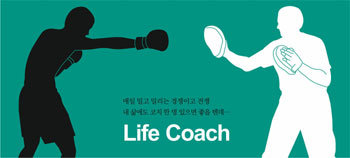Personal Consulting to Help People Help Themselves
Personal Consulting to Help People Help Themselves
Posted November. 14, 2007 08:15,

President Jeon Do-geun of the Korea Life Coaching Association (KLCA) asked participants of a time management coaching seminar held at a building near Hongik University, Seogyo-dong, Mapo-gu on November 8, How many of you manage your time? Twelve out of 15 participants said they didnt. Jeon then said, Then you tend to procrastinate, right? What you should do is to make a schedule for every week. That way, you will be able to finish your work.
Unlike other similar seminars, the audience was getting instant feedback. Kim Shi-hyeon (33), one of the participants, said, The coach is lecturing us as if he is one of us. I realized the importance of time management from his words.
This kind of life coaching consulting method is spreading in the society. Life coaches literally point out the right directions in life. They help those who seek to make changes in their life.
Insurance Salespeople Started Life Coaching-
Life coaching began in the early 1990s when insurance salespeople gave advice to their clients not just on their financial well-being, but also on their personal problems. Later, the practice was combined with management concepts and become a new consulting method.
Life coaching is similar to consulting, but there are differences. Consulting targets organizations, but life coaching focuses on bringing changes to people. It emphasizes helping clients find their problems and work out solutions themselves, even though it is more time-consuming than helping them find short-term solutions. The main consumers of life coaching are company executives who value managing organizations.
It was around 2003 when this new consulting method was introduced in Korea. There are around 10 organizations currently active that cultivate future life coaches. Around 200 members are registered in the KLCA, and a total of 500 people are actively working as life coaches in Korea.
The More You Listen, The More Trust You Build-
Ahn Seung-gwon (31), a job consultant who used to give advice to college students, finished a preliminary course to become a life coach in September. After that, his client pool doubled. He said, In the past, my main focus was to find clients problems, analyze them, and tell them what I found as a result, but now I try to listen more. I try to put myself in their shoes, which helps me build more trust between my clients and me. Ultimately, the satisfaction level among my clients is higher than before.
Shim Hye-ri (26), who recently opened up an image consultancy in Busan, has been in the consulting business for a long time. After taking a life-coaching course, she was able to change her consulting methods and attract more clients.
She said, I told my clients mostly about how to change their appearance, but now I help them find reasons for their negative image and try to find ways to address their fundamental problems.
Life coaches say, Clients can only find the determination to solve their problems if they find out what they are on their own. Voluntary participation is the key to effective life coaching. Instead of buying them fish, you teach them how to catch fish.
Three-months of Life Coaching and One-on-One Meetings-
Life coaching is applied not just to business, but to other areas. KLCA teaches life coaching in more than 20 areas. Major categories include leadership, business, well being, life, health, and happiness, and each category contains 4-6 sub-categories.
There is no official certification for a life coach. A license is usually issued when one finishes a life-coaching course. Depending on the life coaching organization, tuition fees and teaching curriculums vary. One organization issues a certificate only after a two-day preliminary course followed by 11-week intensive course, which cost 3-6 million won. The KLCA, by contrast, has a two-day intensive course priced at 360,000 won.
A life coach provides consulting services to a client for around three months at a time. Usually it is a one-on-one session, but sometimes it is provided in a form of a lecture before many. Coaching fees differ depending on the experience and reputation of a life coach. For example, one senior executive pays 500,000 to 1 million won a month to his life coach, while a Mr. Song (38), CEO of a small company, pays around 200,000 won for his life coach. Relatively new life coaches charge around 100,000 won a month.
corekim@donga.com







